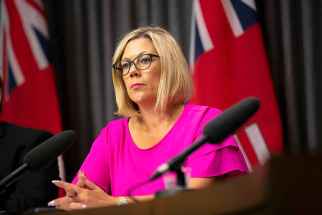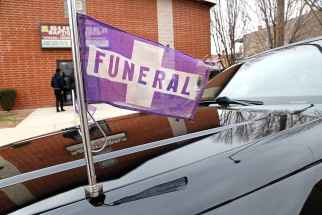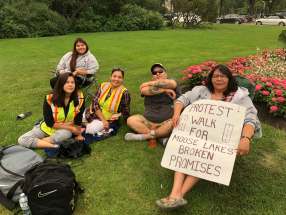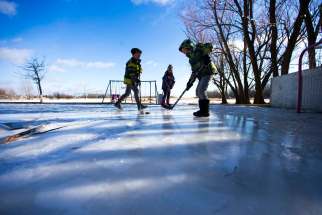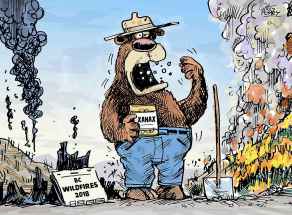Fifteen fatalities on Highway 384 demand province’s attention
Read this article for free:
or
Already have an account? Log in here »
To continue reading, please subscribe:
Monthly Digital Subscription
$0 for the first 4 weeks*
- Enjoy unlimited reading on winnipegfreepress.com
- Read the E-Edition, our digital replica newspaper
- Access News Break, our award-winning app
- Play interactive puzzles
*No charge for 4 weeks then price increases to the regular rate of $19.00 plus GST every four weeks. Offer available to new and qualified returning subscribers only. Cancel any time.
Monthly Digital Subscription
$4.75/week*
- Enjoy unlimited reading on winnipegfreepress.com
- Read the E-Edition, our digital replica newspaper
- Access News Break, our award-winning app
- Play interactive puzzles
*Billed as $19 plus GST every four weeks. Cancel any time.
To continue reading, please subscribe:
Add Free Press access to your Brandon Sun subscription for only an additional
$1 for the first 4 weeks*
*Your next subscription payment will increase by $1.00 and you will be charged $16.99 plus GST for four weeks. After four weeks, your payment will increase to $23.99 plus GST every four weeks.
Read unlimited articles for free today:
or
Already have an account? Log in here »
Hey there, time traveller!
This article was published 20/08/2018 (2669 days ago), so information in it may no longer be current.
Janet Knight will never forget the day she met 12-year-old Jordan Merasty.
Merasty was with his sisters, visiting Mosakahiken Cree Nation from his home in Pelican Narrows in Saskatchewan, when the car he was travelling in rolled off Highway 384.
Knight was first on the scene. Merasty was awake when she got to him.
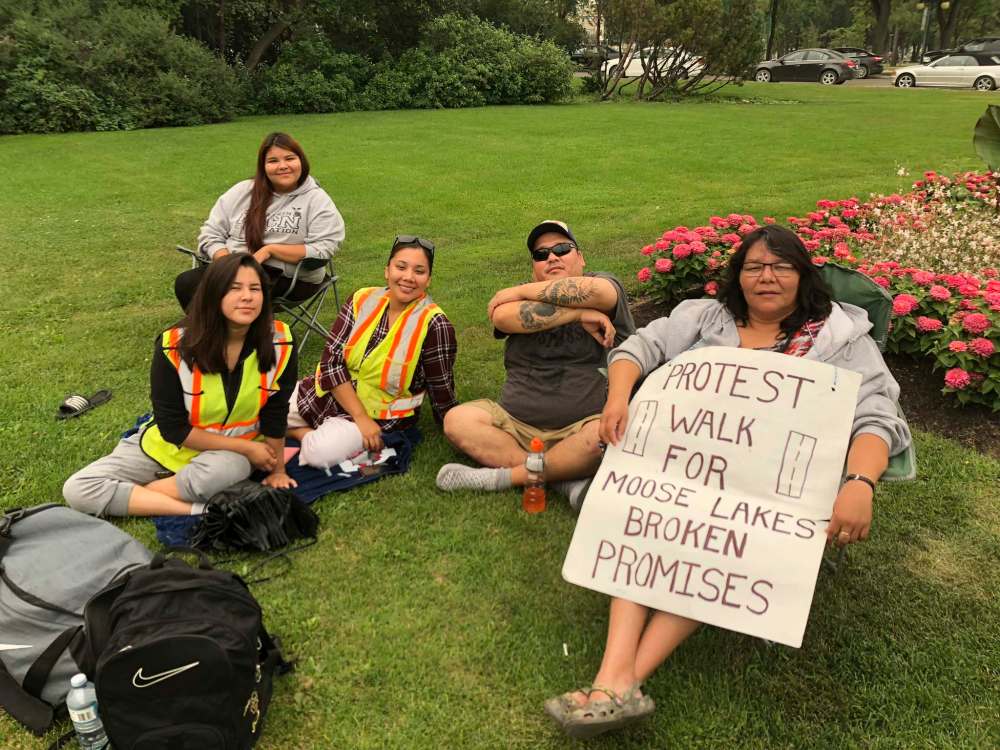
“I held that young man,” Knight recounts, her voice filling with emotion. “I prayed with him. He wasn’t even from our community.”
Although eight months pregnant, Knight considered carrying Jordan to her car and driving to the nearest hospital, which is more than 100 kilometres away in The Pas.
But before she could act …
“He died in my arms. I’ll never forget him.”
Wiping tears from her eyes, Knight shared this story on the steps of the Manitoba legislature at a “protest” Thursday afternoon. She was one of 125 Mosakahiken citizens who had walked more than 600 kilometres to demand the Manitoba government fulfil a promise to pave Highway 384.
Yes, you read that right. Six hundred kilometres. By foot.
Most of us take pavement for granted. We complain about a pothole or two on the way to work. None of us risks our life to buy groceries or attend school or see a doctor.
For Mosakahiken citizens, this is life.
To do something about it, 125 citizens travelled to Winnipeg. In “relay” style, dozens walked at once. At night time, they slept in tents. One rainy night, most slept in the bus.
That is, until the bus broke down and they had to rent a new one.
Did I mention that a quarter of the group were children?
How do Winnipeg potholes look now?
Highway 384 is a 64-kilometre dirt road that floods up to 50 times a year. It has washboard conditions due to being built on muskeg, low-lying marsh. There is no ditch for drainage, making the road safer to travel in winter than anytime else. Drivers can only go about 40 kilometres an hour, or risk death.
Chief Jim Tobacco calls the road the community’s “lifeline” but says conditions are “deplorable.”
Community members carry photographs of the damage on the road and freely share them. In one, nearly two feet of flooding covers sections, making passage treacherous.
The province re-sands Highway 384 and makes conditions suitable – until rainfall.
The former NDP government delivered a verbal promise in 2016 to pave Highway 384. “Then the PCs came to power,” Tobacco added, “and they didn’t even inform us that they were scrapping (the project).”
This is not a convenience issue, it’s a safety issue. People die travelling Highway 384.
At the legislature, Walk spokesperson Shelby Tobacco read Jordan’s name along with 14 others who have died while driving on Highway 384: Ronald Lambert, Bernard Ettawakapow, Norman Ettawakapow, Patrick Buck, Terra Lyn Nasekapow, Kiplan John Nasekapow, Priscilla Nasekapow, Fabian Buck, Abel Martin, Dion Campbell, Justina Campbell, Arthur Lathlin, Linus Easter and Stanley Martin.
“These are human beings,” Tobacco pronounced, “somebody loved them.”
On social media, people added more names, including those who have been permanently injured or disabled.
The situation is, in a word, inhumane.
So, the community walked in “protest” – if asking to be treated as human beings is a protest.
In response, Manitoba Indigenous and Northern Relations Minister Eileen Clarke met with Chief Tobacco, Assembly of Manitoba Chiefs Grand Chief Arlen Dumas, and Manitoba Keewatinowi Okimakanak (MKO) Grand Chief Garrison Settee on Thursday afternoon.
Of the meeting, Clarke’s spokeswoman, Andrea Slobodian, told the Free Press: “We are committed to work together with the community to discuss options, which could also include equipment upgrades to maintain the current road. Manitoba Infrastructure considers provincial road 384 a very good gravel road.”

Jordan Merasty’s family may beg to differ.
Still, construction projects take time and discussion.
Forgive Mosakahiken if they’ve heard this before.
Promises – well meaning as they can be – mean almost nothing. In fact, governments don’t make written commitments because they don’t have to. Infrastructure projects come from budgetary decisions by the Treasury Board. Requests get put into the queue alongside other projects. These are sifted through an analysis of political costs and benefits.
To be blunt, government promises don’t matter. Politics does.
It helps when those who need infrastructure vote for the party in power. For more, see the cancellation of the physical education space at Kelvin High School and the new gym at Altona High School. Kelvin was able to proceed due to a fairly affluent community and fundraising base.
Mosakahiken has neither affluence nor political capital. The area historically votes NDP.
Add to this the fact that, regardless of the high costs of health, social services, and education, bills are often paid at the expense of on-reserve projects such as housing and water.
Provincial governments are paid for services to First Nations in one way or another. The federal Indigenous Affairs Department makes sure of this.
For the Manitoba government there is one main cost here: a human cost.
I hope they see it. And make Highway 384 safe.
Until then it’s a dire situation for Mosakahiken.
And there’s really only one thing that will ensure anything happens.
Us.
Our interest.
Our votes.
Our demands that people at Mosakahiken be treated like us.
As human beings.
We are the ones who can stop people from dying. People like Jordan.
If we join the Mosakahiken Walkers.
And never forget.
Niigaan Sinclair is Anishinaabe and is a columnist at the Winnipeg Free Press.

Niigaan Sinclair is Anishinaabe and is a columnist at the Winnipeg Free Press.
Our newsroom depends on a growing audience of readers to power our journalism. If you are not a paid reader, please consider becoming a subscriber.
Our newsroom depends on its audience of readers to power our journalism. Thank you for your support.

